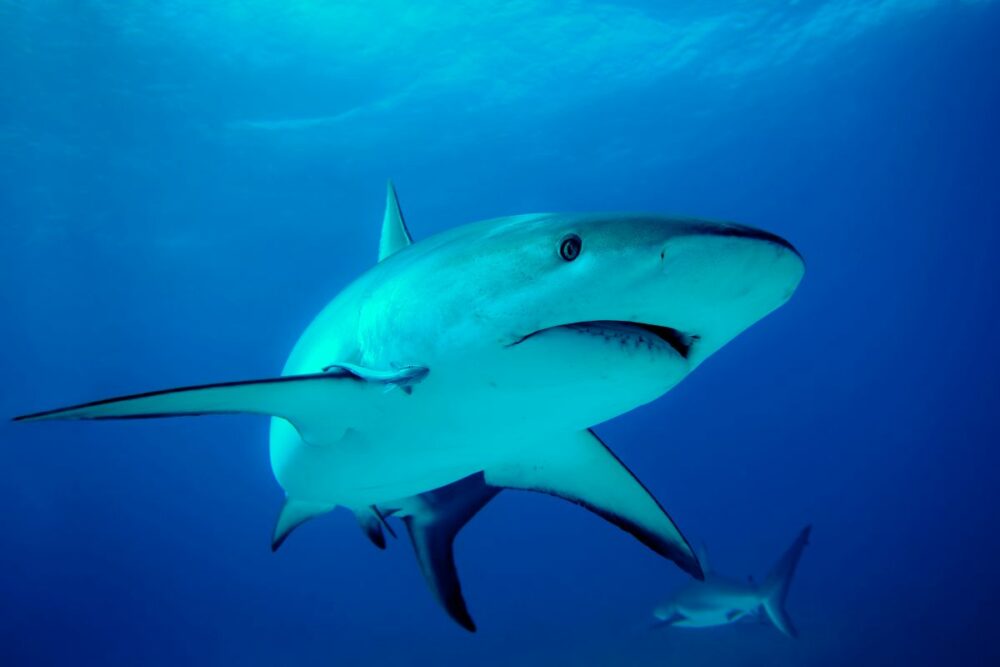Sharks are perhaps some of the most feared animals in the ocean, maybe even the world. Being the subject of countless horror and action movies and series, sharks are often painted as mindless, bloodthirsty creatures.

However, sharks are far from this popular depiction, with many having no interest in humans unless either starving or provoked. This leads people to realize that, once they have learned this fact, there is a lot that they simply don’t know about them.
Perhaps one of the most mundane, and still somehow most intriguing, is the simple question of what sound sharks make. Well, that’s what we’re going to answer in this piece, by explaining what, how, and why sharks sound like they.
That is when they can be heard at all!
Do Sharks Make Sounds?
Before we get any deeper into this topic, we should probably ask the burning question that we have posed here: Do sharks even make noises in the first place?
Well, the honest answer is, no.
Now, this may seem obvious at first. After all, sound to our human ears does not travel particularly well underwater, so being unable to hear sharks does make sense, at least from our land-based, solid-ground perspective.
However, once you consider that so many sea animals seem to love making noises, from iconic whale songs to shrimps snapping and dolphins yapping, suddenly the lack of noise seems a little stranger.
So, what’s that about these famously silent hunters?
Why Do Sharks Not Make Any Noise?

So, what exactly is behind this zero-sound policy that sharks seem to have?
Well, several things are behind it, it turns out. Marine biologists and zoologists have a few ideas about the deafening silence from the biggest predatory fish in the sea.
Predatory Silence
Well, the silence of sharks is by design. Or at least, by selective pressure from evolution and natural selection, thanks to their lifestyle.
As active predators, sharks cannot afford to be spotted or sensed by any prey that they may be hunting. It’s a common rule that most active carnivores live by, particularly ambush predators, both on land, and in the water.
Think about how other predatory species hunt. Lions, tigers, crocodiles, hunting spiders, and mantises. Even your house cat!
All these animals function as ambush hunters, laying in wait for their target to slowly approach until they are within striking distance, then bursting from their spot to take down their prey in a single strike.
And if you’re hiding from your prey, making a sound isn’t just superfluous. It could be the difference between feeding today and starving to death.
So, ambush predators don’t make noises to avoid being detected. That makes sense, for the most part.
However, even this isn’t a satisfying answer, once you start to analyze it.
Because while we know that Lions need to be quiet when hunting, a lion’s roar is still one of the most iconic sounds in nature, up there with the neigh of a horse, or the trumpet of an elephant. Lions and tigers are ambush animals, yet, they
Not Won’t, But Can’t
Leading on from the last point, probably the biggest reason that we don’t hear any noises coming from sharks isn’t just because they won’t. They biologically can’t make noises.
Sharks lack the organ that many other animals have that allows them to make vocalizations from their mouth or body. This again ties to how evolution has and is affected by shark behavior, and vice versa.
Many of the ambush predators we have talked about, besides animals like spiders, still socialize with other members of their species, with lions famously living in large prides of other lion adults and children. In these settings, noise becomes a way for these animals to communicate with each other.
Sharks, with some exceptions, are often solitary hunters that do not even need sound to communicate with each other. So, with a lifestyle that does not favor making sounds, why spend energy or time developing a sound organ over millions of years?
When sharks do communicate with each other in the more social species, such as with lemon sharks, it is through gestures and body language, like mantises and spiders do.
The Exception
So, that’s it, right? All sharks make no noise, period.
Well, again, it’s not quite as simple. As it turns out, there is at least one recorded example of a species of shark that does make noises.
The draughtboard shark, found off the coast of New Zealand, is a species of shark that is known by local fishermen to create a calling sound that is eerily similar to a large dog’s bark.
How and why this species can make this sound is up for debate, with people still just how this animal has evolved to bark when sharks ostensibly have no sound organs.
One of the main proposed theories is that the sac that these sharks use to inflate themselves (like puffer fish) can create a barking sound when filled with air and released, but whether or not this is 100% true has yet to be confirmed.
Frequently Asked Questions
Do Sharks Attack Divers?
The answer is almost always no.
Sharks only ever seem to attack people when they clearly cannot see them in front of them, and mistake them for animals that they would normally eat, such as seals.
When away from the surface of the water, sharks, can see humans and generally do not interact with them.
Final Thoughts
So, at the end of this explanation, we come back to the question we started with: Do sharks make noises?
Well, as we have explained in this article, sharks are almost tailor-made to be silent hunters in the sea, and making a sound would only get in the way of survival with them. Especially when body language is more than enough for most sharks’ needs.
However, like with many examples of animals in nature, the lines are never so easy to draw, and there is at least one exception that we know of where sharks decided that they need to be heard.
Nature truly is a strange creator, isn’t it?
- Sustainable and Luxurious: Discovering Split’s Yachting Paradise – April 26, 2024
- MarineTraffic vs VesselFinder: Which Is Better Vessel Tracking Service? – February 14, 2024
- Port Costs: A Comprehensive Guide to Port Dues and Fees for Cargo Ships – February 12, 2024





Leave a Reply